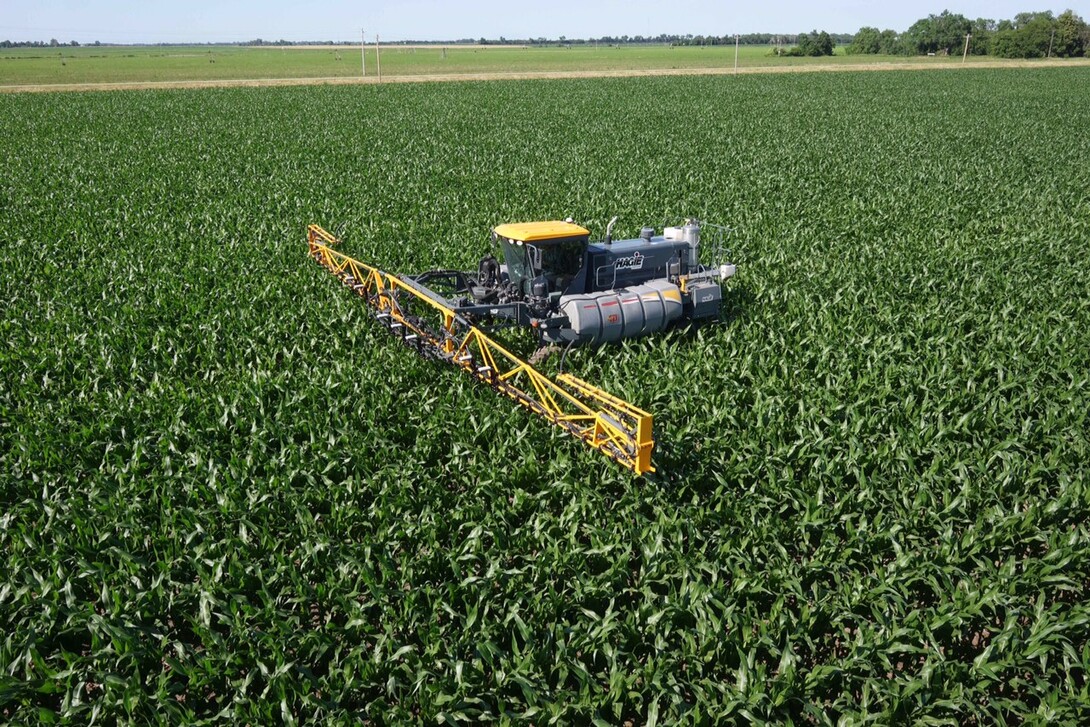
May 4, 2016
Lincoln, Neb. — When and at what rate nitrogen fertilizer should be applied are major questions for today's corn producers. Nebraska Extension is helping answer these questions through Project SENSE, which stands for Sensors for Efficient Nitrogen Use and Stewardship of the Environment.
Over the last 40 years, producers have greatly increased fertilizer efficiency, but that gain in efficiency may be starting to plateau. This points to the need to adopt new technologies to reach efficiency increases producers are used to seeing. Project SENSE, implemented by Nebraska Extension for the first time last year, is focused on improving nitrogen use efficiency by fertilization during the growing season.
Richard Ferguson, Nebraska Extension soil specialist, is leading the project, which focuses on using crop canopy sensors to direct variable-rate, in-season nitrogen application in corn. The sensors are attached to the nitrogen applicator and work by emitting light onto the crop canopy. Photodetectors on the bottom of the sensor measure specific wavelengths of light that are reflected by a leaf. The wavelength information is recorded by the crop canopy sensor and combined to form an index that has been correlated to the nitrogen status of the crop. This information is used by the system to generate a recommended rate of additional fertilizer that is then applied to the crop in real time.
"Farmers aim to apply fertilizer at a time and rate that will maximize yield," Ferguson said. "Project SENSE can help them better define what the appropriate rate should be based on how stressed the plant is for nitrogen."
When it comes to timing, a goal of Project SENSE is to show producers the benefits of moving fertilizer application from the fall and spring into the growing season. Corn does not typically begin using significant amounts of fertilizer until June or July, so when fertilizer is applied months before, there is a long window of time when fertilizer can be lost.
"May is one of our wettest months of the year in Nebraska, so if we have fertilizer not being used by the crop, it's going to be lost with rainfall," Ferguson said.
Project SENSE was implemented at 17 research sites across five natural resources districts in Nebraska in 2015. Results from the first growing season are encouraging. Use of the sensors reduced the nitrogen rate by 40 pounds per acre compared with the grower's standard management practice. While this did cause a slight yield reduction of five bushels per acre, producers saw an overall increase in profit because of reduced fertilizer cost. Researchers estimate that the sensing equipment would pay for itself in two to three years in a typical Nebraska farming operation.
Brandon Hunnicutt, a farmer in south central Nebraska and member of the Nebraska Corn Board, participated in Project SENSE in 2015. Hunnicutt, like many Nebraska corn farmers, is concerned about managing inputs and improving efficiency.
"Project SENSE is a forward-thinking approach in using technology to increase nitrogen use efficiency that in addition continues farmers' stewardship of the environment," he said.
Nitrogen is a dynamically moving nutrient in soil, making it difficult to manage because it can be lost through many pathways in the environment, which can lead to high-nitrate groundwater. Strategies implemented through the project, such as in-season fertilizer application, can improve groundwater nitrate levels.
The project team plans to implement studies at 20 locations in 2016 and hopes to encourage producers to adopt the technology, for both economic and environmental reasons.
"With Project SENSE, we'll continue to evaluate ways to increase efficiency to maintain economic yield levels, and also reduce nitrogen loss into groundwater," Ferguson said.
The project is a collaborative effort of Nebraska Extension, Nebraska Corn Board and Nebraska Natural Resources Districts.
Richard Ferguson
Soil Specialist
Nebraska Extension
402-472-1144
rferguson@unl.edu
Haley Steinkuhler
Media Specialist
IANR Media
402-472-4398
hsteinkuhler2@unl.edu







